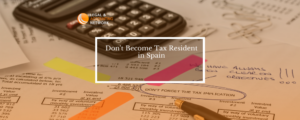what is this tax, what does the ruling mean, and how long will it cease to be levied?
The Constitutional Court’s decision approved on 26 October 2021, to invalidate the capital gains tax paid by local councils poses a major threat to the local administration. The high court has declared unconstitutional the method of calculating the tax base of this tax, which is fundamental for municipal finances. These are the key aspects of the tax and the consequences of the ruling.
What is this tax?
The tax on the increase in the value of urban land (IIVTNU), better known as municipal PLUSVALIA tax, is a direct tax levied and managed by local councils. It is paid when a taxpayer sells, donates or inherits a property. The tax is levied on the revaluation of the urban land on which a property is built from the time of purchase until its transfer, whether by sale, inheritance or donation.
Who pays it?
When a property is sold, it is the seller who has to pay the tax as he is the one who receives the money from the sale. However, in the case of a donation, the tax is payable by the person who takes the property.
How is it calculated?
The capital gains tax is regulated by articles 104 to 110 of the Ley Reguladora de las Haciendas Locales. To calculate the PLUSVALIA tax, the cadastral value of the property and the time elapsed from when the property is acquired until it is sold or donated must be taken into account, as explained in article 107 of the aforementioned law. In order to obtain the taxable base on which the tax will be applied, revaluation rates established by the local councils are applied, which vary according to the number of years the property has been owned. These revaluation rates range from a maximum of 3% (for periods of up to 20 years) to 3.7% (for periods between one and five years). Once the taxable base has been determined, the tax rate set by the local council is applied to it, with a maximum of 30%. The resulting amount is what the taxpayer must pay as PLUSVALIA.
For example, a taxpayer who bought a flat in 2010 with a cadastral value of 150,000 euros and sold it at the beginning of 2021 should check what the revaluation of his property has been. Assuming that his local council has fixed the maximum rate of revaluation, for a period of up to 15 years he is entitled to a rate of 3.2%. Therefore, the revaluation of the cadastral value of the property will be the result of multiplying 3.2 by the 11 years that the property was owned. The result would be 35.2%, which applied to the cadastral value of 150,000 euros leaves a taxable base of 52,800 euros. The tax rate would be applied to this amount. Assuming that in that municipality it was the maximum of 30%, that person would have to pay 15,840 euros.
Why does the Constitutional Court declare this tax unconstitutional?
The high court ruling declares “unconstitutional and null and void” three sections of article 107 of the Ley Reguladora de las Haciendas Locales, which regulate the calculation of the taxable base of the PLUSVALIA.
It is calculated according to mathematical rules that do not take into account the real gain or loss produced in the transfer. This means that this tax violates the principles of equity, justice and economic capacity that taxes must comply with.
As a result, a few years ago the Constitutional Court declared that this form of calculation was unconstitutional in cases where a property was transferred at a loss or a profit was obtained that was less than the tax to be paid: This led to numerous claims to reform the law.
What are the consequences?
In the absence of knowing the final reform of this tax, lawyers agree that this new ruling opens the door to councils having to return the amount of taxes that have been appealed.
Therefore, in application of the retroactive rule, those who had already claimed the tax before 26 October, (date in which the Constitutional Court approved that the plusvalia tax is null), can benefit of claiming a reimbursement, or a more favourable calculation of this tax as per the new tax rules.
What does it mean for local councils?
Since the publication of the sentence declaring the Plusvalia tax as unconstitutional, the local councils will not be able to collect the tax until the Treasury changes the rules to reform the tax. Therefore, the tax will be annulled until then.
This tax is of great importance for the finances of local entities, hence the urgency that the government approves as a matter of urgency an adapted one.
It is the second most important tax figure for local tax collection, after IBI (Property tax). Spanish local councils received more than 1,700 million euros in 2020 from this tax.
How will the new plusvalia tax be calculated?
As per the new regulation Royal Decree-Law 26/2021 approved on 8 November 2021,the nature of the tax remains unchanged. In other words, the tax is levied on the increase in the value of the land, as evidenced at the time of accrual and experienced over a period of 20 years.
It establishes the option of calculating the tax using two criteria:
- Based on the cadastral value of the land at the time of the transfer, although with new coefficients set by the Ministry, that will be more objective and adjust to the real market value.
- Calculating the tax base on the difference between the purchase value and the sale value declared on the purchase/sale title deed.
Taxpayers will be able to choose the option that is most favourable.
If you do not obtain a capital gain from the sale of the property, you will be exempt from paying this tax.
When will the new plusvalia tax be applicable?
The local Town Halls that have established the Plusvalia tax must modify, within six months of the entry into force of this Royal Decree-Law 26/2021, their respective municipal tax rules to bring them into line with the RD. Until this modification is approved, the maximum coefficients provided for in article 107.4 of the RD will be used to determine the taxable base of the tax.






